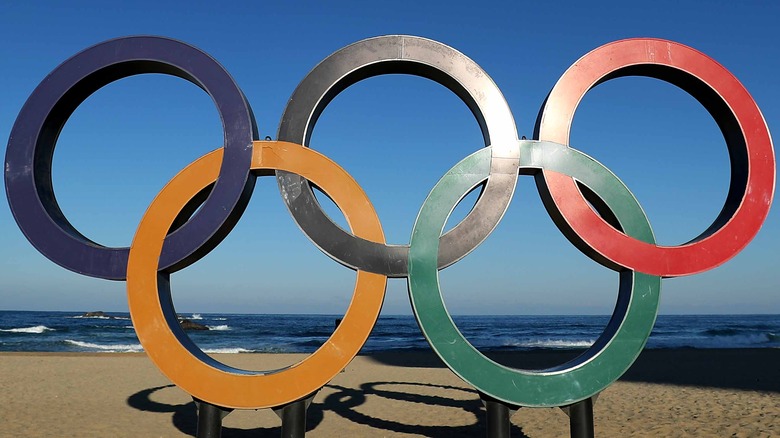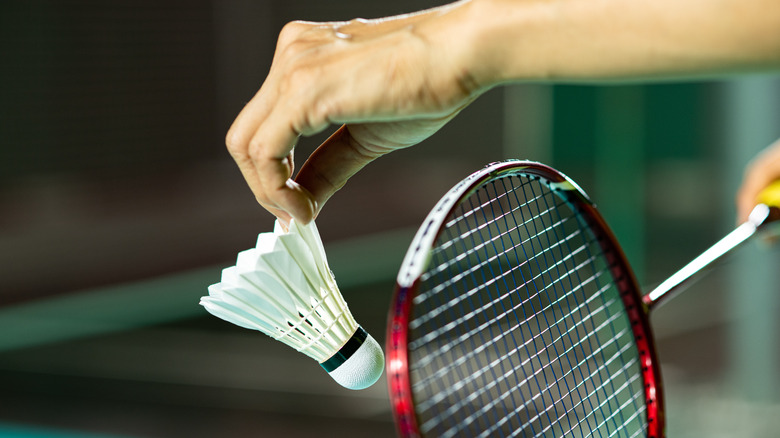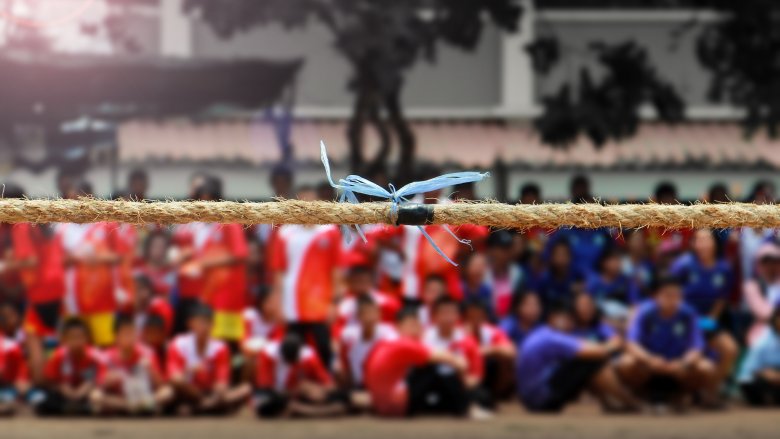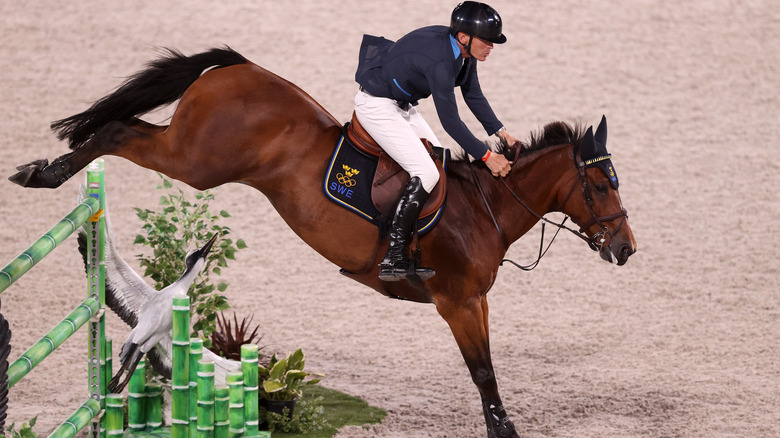Tricky Ways Athletes Have Cheated In The Olympics
Making it to the Olympics means you're almost superhuman. You've gotten your body and mind into perfect shape, so you're able to push through the pain and achieve things that only a few people on Earth can do. And if you're the very best, you win a medal that shows everyone that all the sacrifices were worth it. It's a beautiful moment. Unless, that is, you cheated.
Some people make it to the Olympics and decide they won't just rely on putting in hard work, but try and get away with cheating. And while you might think you know a couple ways athletes try to get that unacceptable extra edge, you'd probably be shocked at the crazy ways people have actually tried to cheat their way to victory.
Trying to lose
When you get tickets to watch Olympians play a sport, you expect to see some of the greatest athletes in the world do something you could only dream of. But the spectators of the 2012 London badminton matches didn't always get what they paid for. Four teams tried to cheat by losing games.
Yeah, at first that makes no sense. How could losing possibly give you a better chance at a medal? According to The Guardian, it all has to do with the way the stages worked. There were group stages followed by knockout rounds. One of the Chinese teams, the best in the world, was playing the South Korean team in the group stage. They realized that if they lost that game, they wouldn't have to face the other Chinese team until the final match, meaning China could take home gold and silver. But if they beat the South Korean team, they would play their fellow countrywomen much earlier in the knockout stage.
They were so obviously throwing the game that the crowd started booing them. The South Korean team realized what they were doing and started playing badly as well. The longest rally was four strokes, and both teams kept hitting wide shots and serving into the net. Officials came out and warned them to start playing to win, but they didn't listen. In the end, four different teams would be disqualified for trying to lose, all so they could have a better chance at a medal.
Rewiring a fencing kit
If you wanted to get into sports as a kid but really weren't sure just what you wanted to excel at, you might have gone for the modern pentathlon. The five events it's made up of could not be more different: pistol shooting, fencing, 200-meter freestyle swimming, show jumping, and a 3-kilometer cross-country run.
One of the athletes at the 1976 Montreal games, Russia's Boris Onischenko, had won the gold with his team in 1972 and decided he liked it so much he was going to do it again four years later. And Paste Magazine says he wanted to guarantee it by straight cheating. During the fencing portion of the event, he was able to score a point without hitting his opponent, thanks to the rewiring of his epée (the skinny little sword). All he had to do was get close to his opponent and then flip a switch in the handle of the epée to make it register a hit.
But his British adversaries noticed something was up. They thought it was an innocent mistake and not that Onischenko had totally hacked into his epée. He might have done it because of the huge political pressure for the Soviet Union to win golds.
The saga of "Dis-Onischenko," as the papers dubbed him, lived on. The rules were permanently changed to make it impossible to cheat in the same way. But if someone wants to cheat, they will, as we'll see.
Switching with a twin
If life is anything like the movies, it must be fun having an identical twin playing pranks on your parents and your teachers by switching places unexpectedly just for fun. But as annoying as that would be for your authority figures when you're young, the Olympic Committee also frowns on the practice.
According to UPI, it happened at the 1984 Los Angeles Olympics. One Puerto Rican competitor, Madeline de Jesus, had qualified for the long jump and the 4x400 relay. She did her thing on the long jump, according to Remezcla, but she hurt herself. There was no way she'd be able to run the relay. She could have done the honest thing and bowed out, but instead she decided to turn to her identical twin sister for help.
Margaret de Jesus was also a competitive athlete, but she hadn't qualified for the Olympics. Still, like a supportive sister, she came out to Los Angeles to cheer Madeline on. So she was right there in the stands and available to help out when Madeline asked her to be a ringer. A dead ringer, in this case, since the only difference between the girls was a beauty mark on one's cheek.
Margaret subbed in and Puerto Rico made it to the finals, until a journalist outed them. The coach said he was told about the plan but "didn't think they would go through with it." Which is probably what most rational, non-cheating people would think.
Pretending to be disabled
While it's totally normal to assume that some athletes in the Olympics are trying to cheat their way to victory, it's less common to think that about Paralympic athletes. But according to The Guardian, cheating is rampant at the Paralympics. Participants have come up with some really creative ways to be put in less difficult categories so they have an edge. But no one has ever gone so far as the Spanish basketball team at the 2000 Sydney Paralympics.
The Paralympics don't just have categories for physical handicaps, but for mental handicaps as well. That was one of the things that made it easier for the Spanish team to cheat. It's a lot easier to fake mental issues than a missing leg, so that's exactly what they did.
The Local says it started when the president of Spain's Federation for Mentally Disabled Sports approached 12 semi-professional basketball players, none of whom had a mental disability, with the idea of competing in the Paralympics. He reassured them that plenty of teams cheated like this at the games and that they'd get a lot of money and sponsorship deals if they won. So the team agreed.
In some games they played too well and had to be told to turn it down to avoid detection, but they managed to make it through the whole tournament and take home the gold. Then they were outed as flagrant cheaters ... by a member of their own team.
Wearing huge, heavy shoes
The Olympics used to be very different than it is today. No, not just in ancient times; even when the games were brought back in the late 1800s. Not only were there categories for things like poetry and sculpture, but even some of the sporting events were pretty darn unexpected. For, example, it's hard to imagine a group of people training every day of their lives to prove they're the tug-of-war champions of the world.
Yes, tug-of-war. (No clue why other childhood playground games like hopscotch or jumping rope didn't make the cut.) Even if it seems like a bit of a joke sport, people were serious enough about it to cheat.
The drama occurred during the 1908 London games. The Great Britain teams were feeling the home team advantage and looked set to do well. But according to the Liverpool Echo, one team, made up of police officers from Liverpool, decided to give itself a bit of help. It all came down to their shoes, which were "so heavy in fact that it was only with great effort that they could lift their feet from the ground."
Since, wearing shoes like that would make it difficult to walk, the cheating was pretty obvious, and one American team complained after they lost. But the judges determined they didn't break the rules of banning "prepared boots or shoes with any protruding nails." Good thing they had the extra weight — even with it, they only managed to win the bronze.
Juicing their horses
It's somewhat expected that some athletes will use performance-enhancing drugs. It's less expected that athletes would share those kinds of drugs with the horses they rode in on. According to CNN, during the 2004 Athens games, one of the horses in the showjumping competition, Waterford Crystal, tested positive for the banned substances fluphenazine and zuclophenthixol, both of which would also make fabulous horse names. To be fair, a committee ruled that while the rider Cian O'Connor had to give up his gold medal, he probably hadn't knowingly given his horse the banned substances.
Some competitors must have looked at their fellow athlete being disqualified and (instead of learning a good lesson about how cheaters never prosper) thought to themselves, "That looks like a good idea, only we'll do it on purpose!"
According to the Telegraph, at the 2008 Beijing games, four showjumping horses and their riders were disqualified for doping. The human competitors don't really deserve to be named since they're big cheats, but why deprive ourselves of enjoying the horses' monikers: Latinus, Coster, Chupa Chup, and Camiro. (Must have all had celebrities for parents.) The doping scandal was so bad that year that the Telegraph said it threw the future of all equestrian events at the Olympics into question. But things seem to have recovered, and we might yet see an obviously 'roided out horse jumping fences one day.
Hitching a ride
If there's one thing we know about marathons, it's that they require a lot of running. And some people might stop mid-run and think, "Why am I doing this?" There are faster ways to get from Point A to Point B. Taking a shortcut is fine if you're out for a casual jog, but it's frowned on if you're competing in the Olympics.
It didn't take long for people to start cheating at the marathon in the modern Olympics. According to the New Yorker, it happened in the very first modern games in 1896 in Athens. The bronze medalist had actually gone part of the way by carriage. Spiridon Belokas earned the distinction of being the first cheater of the new Olympics.
By the 1904 games, things had advanced considerably. For example, now you had cars to cheat with and didn't have to rely on slow, outdated carriages.
The Smithsonian says competitor Fred Lorz started out legitimately. He went along at a good pace for 9 miles, but he started getting stomach cramps. Instead of just taking a break to recover, he decided to hop in the car his manager was driving alongside the runners. And he didn't try to hide what he was doing: He waved at the spectators he passed for the next 11 miles. Then the car broke down and he ran the last 5 miles. He was awarded the gold until spectators pointed out his flagrant cheating.
Liquid courage
There are so many records recorded at Olympic games. But one man has the most dubious of them all: he was the first athlete to fail a drug test. These days that seems almost uninteresting, as there have been plenty of athletes caught cheating that way. Still, Swedish modern pentathlete Hans-Gunnar Liljenwall is special.
The New York Times has the story. Liljenwall competed in three different Olympics: 1964, 1968, and 1972. In 1968, the Swedish team took home the bronze medal, but they aren't in the record books anymore, and it's all because of Liljenwall.
It just so happened that 1968 was also the first year that the Olympics started testing athletes for drugs. It's hard to feel bad for participants who cheat their way to the top of their sport by doing things like blood doping, using performance-enhancing drugs, or taking steroids.
Still, you have to feel a little bit sad for Liljenwall. He wasn't juicing or anything like that. He decided that to steady his nerves before the shooting event, he would drink two beers. Now, you probably wouldn't expect alcohol to help your performance in most Olympic sports, and guns and alcohol are usually not a great combination. But booze is still on the list of banned substances, and Liljenwall was disqualified for having "excessive alcohol" in his system.
Putting children on your team
In almost all Olympic sports, being extremely young is a disadvantage. You need height and strength to be able to achieve the best results. That isn't the case, however, in gymnastics. Then it helps to be tiny and flexible. This has led some countries to forge documents and get younger children to compete for them.
China is notorious for this. According to the New York Times, in 2000, they had to give back their team bronze medal after a year-long investigation determined that one of the girls on the squad had been 14 at the time and not the minimum age of 16.
But the Chinese didn't learn from their mistake. Perhaps spurred on by being on their home turf at the Beijing games in 2008, they fielded a team that had a lot of people asking questions. The Atlantic says it started even before the games began. A New York Times article pointed out that while two of the girls' passports claimed they were 16, other documentation pegged them at 14. Another girl was found to have mismatched information on her age as well.
Then there was the weirdest thing: One of the girls on the squad was missing a baby tooth. Were your teeth still falling out when you were 16? Or did that stop a long time before? Yeah. A lot of people pointed to that as more proof of cheating. Regardless, they took home the gold. This time, they kept it.
The dirtiest race in history
The 100-meter race is the most excitement you can have in 10 seconds at the Olympics. It has made stars out of participants like Usain Bolt, and the winner is considered the fastest person in the world. But running at the Olympics has long been tainted with steroids and other performance-enhancing drug use. None, however, have come close to the sickening display of the 1988 Seoul men's final.
According to Reuters, it's now known as the "dirtiest race in history" because four of the top five finishers would be involved in drug scandals. Ben Johnson, Carl Lewis, and Linford Christie all ran fast enough for medals, but one found his revoked in a huge scandal, and another failed three drug tests but was not punished for some reason.
Ben Johnson of Canada originally got the gold with his world record time of 9.79 seconds. But it was discovered he was using the steroid stanozolol, and he went from being hailed as a hero to being basically chased out of South Korea in shame. American Carl Lewis was seen as the clean-cut golden boy racing against a cheater, but in 2003 we found out he had failed three different drug tests during the 1988 Olympic trials but was allowed to keep his gold. With two other finishers testing positive, there has probably never been another event with so many cheaters taking part and getting caught.








